2011版初中英语新课标同步授课课件:unit 2 Grammar(译林牛津版九上)
文档属性
| 名称 | 2011版初中英语新课标同步授课课件:unit 2 Grammar(译林牛津版九上) | 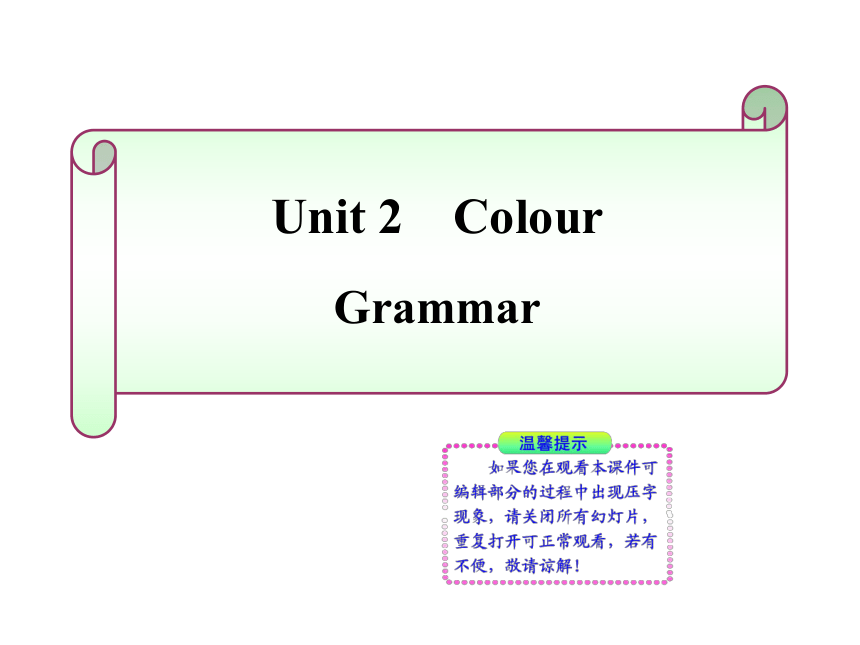 | |
| 格式 | rar | ||
| 文件大小 | 1.2MB | ||
| 资源类型 | 教案 | ||
| 版本资源 | 牛津译林版 | ||
| 科目 | 英语 | ||
| 更新时间 | 2011-11-08 08:09:56 | ||
图片预览

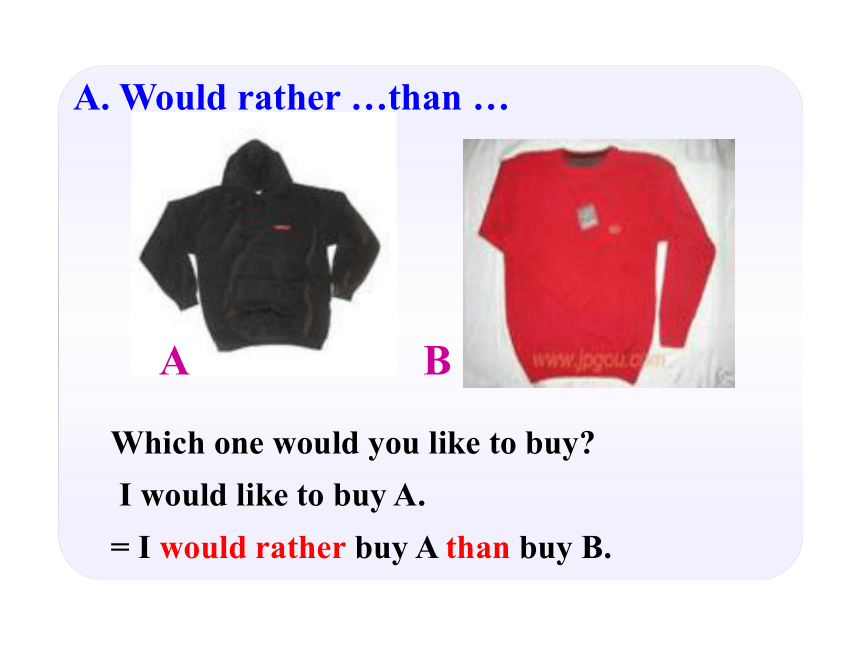
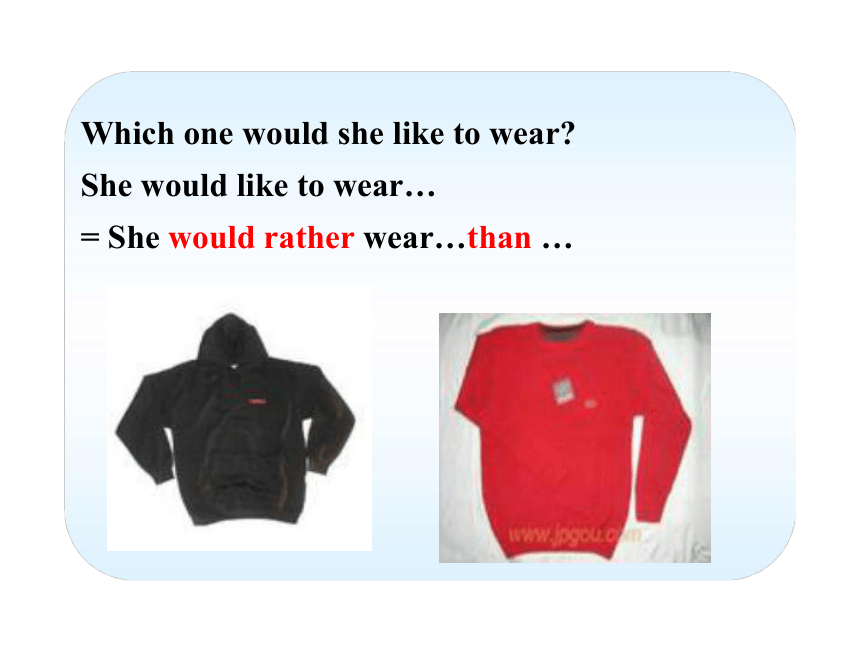
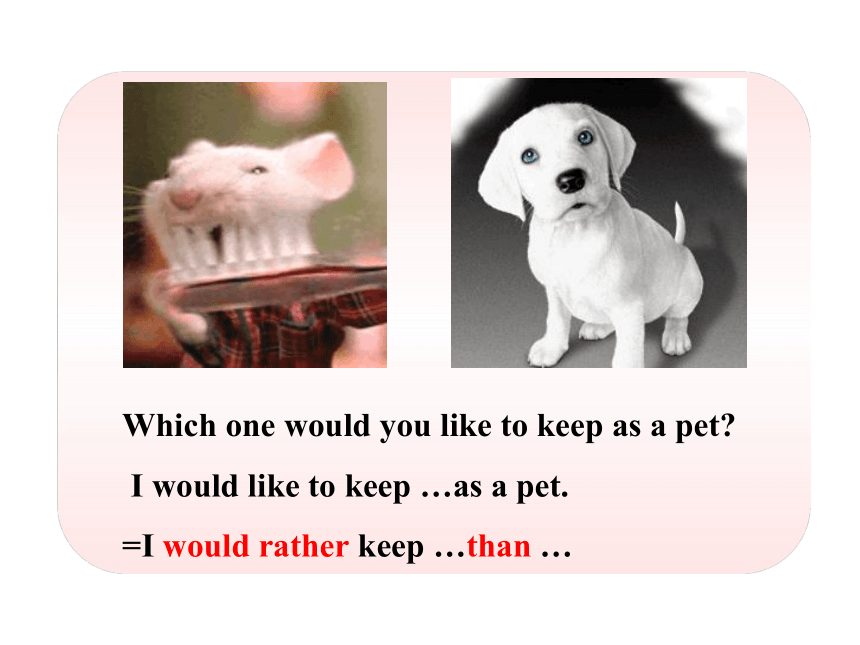
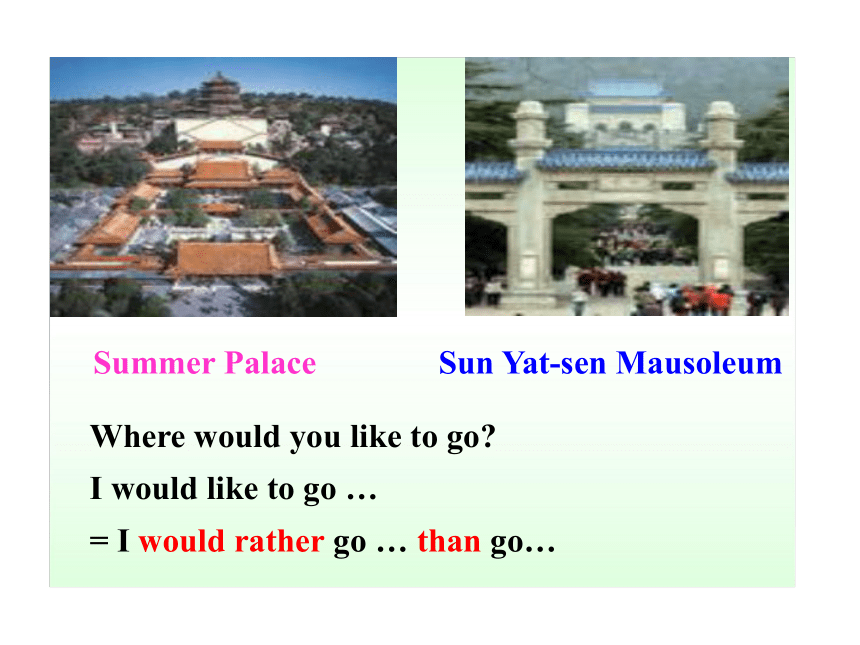
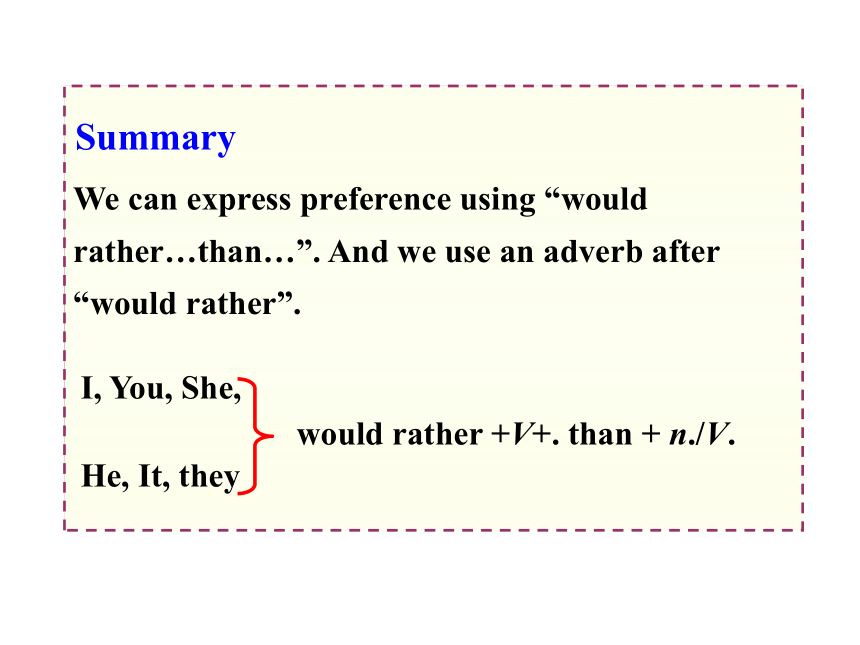
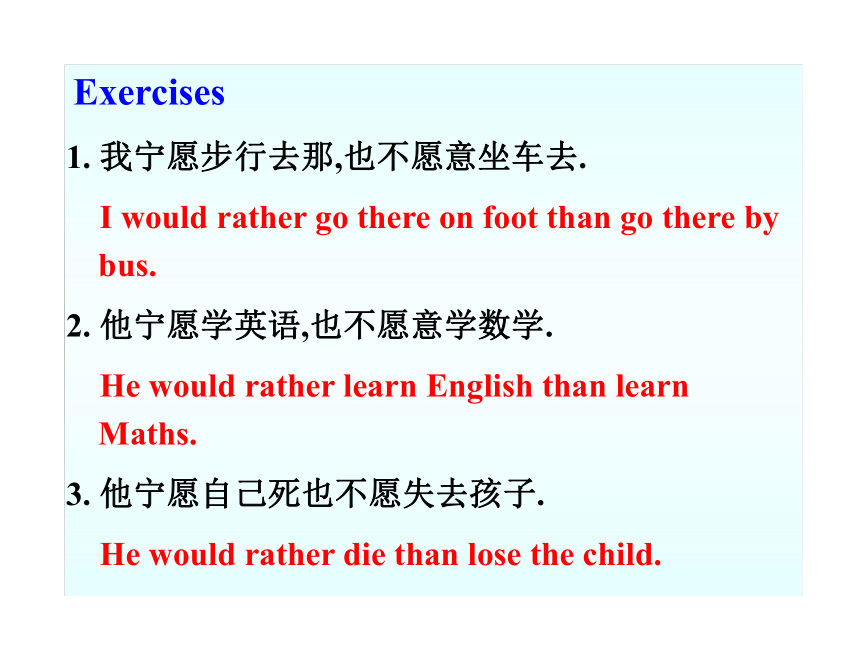
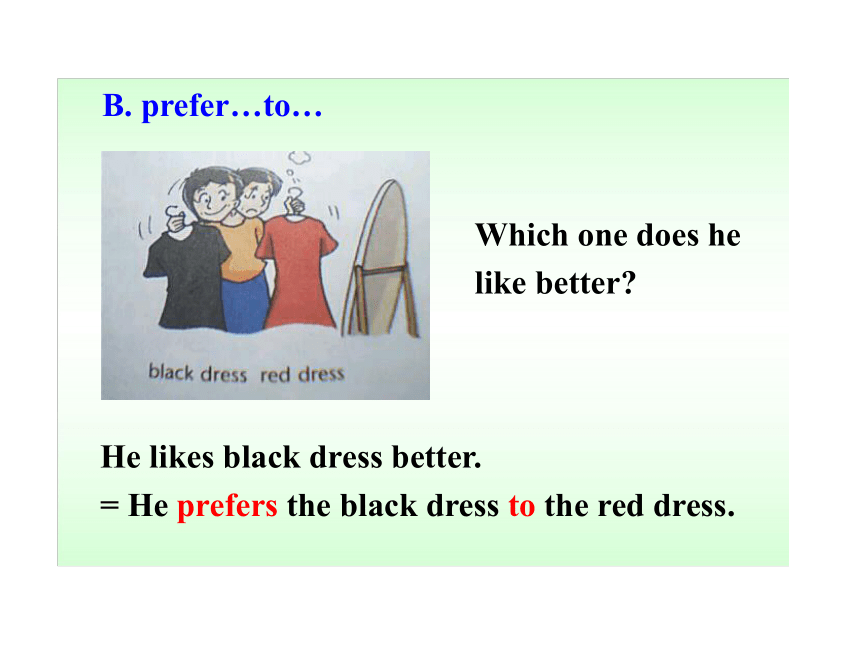
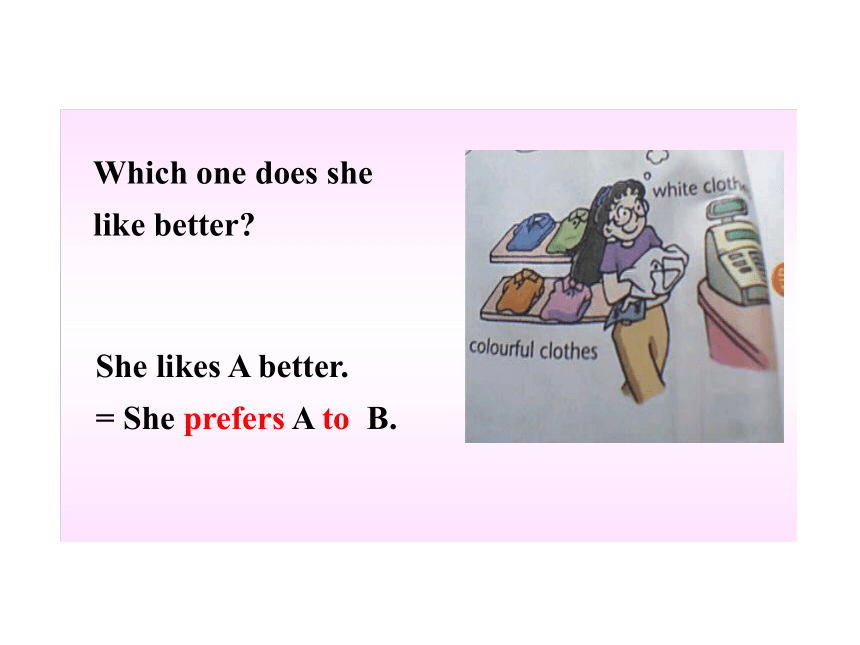
文档简介
(共27张PPT)
Unit 2 Colour
Grammar
Which one would you like to buy
I would like to buy A.
= I would rather buy A than buy B.
A. Would rather …than …
A
B
Which one would she like to wear
She would like to wear…
= She would rather wear…than …
Which one would you like to keep as a pet
I would like to keep …as a pet.
=I would rather keep …than …
Where would you like to go
I would like to go …
= I would rather go … than go…
Summer Palace
Sun Yat-sen Mausoleum
We can express preference using “would rather…than…”. And we use an adverb after “would rather”.
I, You, She, He, It, they
would rather +V+. than + n./V.
Summary
Exercises
1. 我宁愿步行去那,也不愿意坐车去.
I would rather go there on foot than go there by bus.
2. 他宁愿学英语,也不愿意学数学.
He would rather learn English than learn Maths.
3. 他宁愿自己死也不愿失去孩子.
He would rather die than lose the child.
B. prefer…to…
Which one does he like better
He likes black dress better.
= He prefers the black dress to the red dress.
Which one does she like better
She likes A better.
= She prefers A to B.
Which one does she like better
She likes B better.
= She prefers B to A.
He prefers …to …
What would Eddie like to do
Prefer… to… 宁愿,更喜欢=like better
后跟名词或动名词
e.g.: 我喜欢城镇而不喜欢农村.
I prefer the town to the country.
prefer doing sth. to doing sth.
= would rather…than
1. 他喜欢红色而不喜欢黄色.
He prefers red to yellow.
2. 星期天我喜欢出去玩,不喜欢呆在家里.
I prefer to going out to staying at home on Sundays.
=I would rather go out than stay at home on Sundays.
3. Jim喜欢打篮球而不喜欢踢足球.
Jim prefers to playing basketball to playing football.
= Jim would rather play basketball than play football.
Exercises
1. I _____ (would/could) rather go swimming than ___ (to go/go) shopping.
2. I’d rather ___ (eat/to eat) Chinese food ____ (to/than) Japanese food.
3. Many men prefer blue __ (than/to) red.
would
go
eat
than
to
4. I prefer _______ (listening/to listen) to music to playing computer games.
5. Bob prefers _______ (to send/ sending) e-mails to ______ (write/ writing) letters.
listening
sending
writing
C. someone/somebody, anyone/ anybody and no one/ nobody
There is someone in classroom. (改为否定句)
Three isn’t anyone in the classroom.
=There is no one in the classroom.
Where should we use “someone”,
“anyone” or “no one ”
1. We use someone/somebody in positive sentences to refer to people.
2. We use anyone/anybody in negative sentence to refer to people. It’s the negative form of someone/somebody.
Summary
3. When we use anyone/anybody in positive sentences, it means “any person”.
e.g.: Anyone can took part in this competition.
D. something, anything, nothing and none
1. Millie has something in her hands. (否定句)
Millie doesn’t have anything in her hands.
= Millie has nothing in her hands.
=Millie has none.
1. Something, anything, nothing and none are used to refer things.
2. Something is used in positive sentence while anything is used in negative sentence.
Summary
3. When we are offering something or when we expect the answer to be “yes” we can use “something” in questions.
e.g. Would you like something to eat
(You want the person say “yes”.)
Exercises
---What a big box! Can I help you
--- No, thanks. There’s _______ in it. It’s empty.
2. --- Did the doctor live alone in his home
--- He has two sons and a daughter.
But ____ of them live with him.
nothing
none
3. --- There’s _________ wrong with my clock. It doesn’t work.
--- Don’t worry. Let me have a look.
4. --- ________ is in the classroom. Where are they
--- They are all on the playground.
5. --- How easy the Maths exam was!
--- Yes. But I don’t think ________ could pass it.
something
No one
everyone
6. --- Listen! ________ is knocking at the door.
7. ---What do you think of Kitty
--- She is my true friend. She never tells my secrets to _______.
8. --- Helen, what did you talk with Bob
--- He asked me to tell him _________ I knew.
Someone
anyone
something
Unit 2 Colour
Grammar
Which one would you like to buy
I would like to buy A.
= I would rather buy A than buy B.
A. Would rather …than …
A
B
Which one would she like to wear
She would like to wear…
= She would rather wear…than …
Which one would you like to keep as a pet
I would like to keep …as a pet.
=I would rather keep …than …
Where would you like to go
I would like to go …
= I would rather go … than go…
Summer Palace
Sun Yat-sen Mausoleum
We can express preference using “would rather…than…”. And we use an adverb after “would rather”.
I, You, She, He, It, they
would rather +V+. than + n./V.
Summary
Exercises
1. 我宁愿步行去那,也不愿意坐车去.
I would rather go there on foot than go there by bus.
2. 他宁愿学英语,也不愿意学数学.
He would rather learn English than learn Maths.
3. 他宁愿自己死也不愿失去孩子.
He would rather die than lose the child.
B. prefer…to…
Which one does he like better
He likes black dress better.
= He prefers the black dress to the red dress.
Which one does she like better
She likes A better.
= She prefers A to B.
Which one does she like better
She likes B better.
= She prefers B to A.
He prefers …to …
What would Eddie like to do
Prefer… to… 宁愿,更喜欢=like better
后跟名词或动名词
e.g.: 我喜欢城镇而不喜欢农村.
I prefer the town to the country.
prefer doing sth. to doing sth.
= would rather…than
1. 他喜欢红色而不喜欢黄色.
He prefers red to yellow.
2. 星期天我喜欢出去玩,不喜欢呆在家里.
I prefer to going out to staying at home on Sundays.
=I would rather go out than stay at home on Sundays.
3. Jim喜欢打篮球而不喜欢踢足球.
Jim prefers to playing basketball to playing football.
= Jim would rather play basketball than play football.
Exercises
1. I _____ (would/could) rather go swimming than ___ (to go/go) shopping.
2. I’d rather ___ (eat/to eat) Chinese food ____ (to/than) Japanese food.
3. Many men prefer blue __ (than/to) red.
would
go
eat
than
to
4. I prefer _______ (listening/to listen) to music to playing computer games.
5. Bob prefers _______ (to send/ sending) e-mails to ______ (write/ writing) letters.
listening
sending
writing
C. someone/somebody, anyone/ anybody and no one/ nobody
There is someone in classroom. (改为否定句)
Three isn’t anyone in the classroom.
=There is no one in the classroom.
Where should we use “someone”,
“anyone” or “no one ”
1. We use someone/somebody in positive sentences to refer to people.
2. We use anyone/anybody in negative sentence to refer to people. It’s the negative form of someone/somebody.
Summary
3. When we use anyone/anybody in positive sentences, it means “any person”.
e.g.: Anyone can took part in this competition.
D. something, anything, nothing and none
1. Millie has something in her hands. (否定句)
Millie doesn’t have anything in her hands.
= Millie has nothing in her hands.
=Millie has none.
1. Something, anything, nothing and none are used to refer things.
2. Something is used in positive sentence while anything is used in negative sentence.
Summary
3. When we are offering something or when we expect the answer to be “yes” we can use “something” in questions.
e.g. Would you like something to eat
(You want the person say “yes”.)
Exercises
---What a big box! Can I help you
--- No, thanks. There’s _______ in it. It’s empty.
2. --- Did the doctor live alone in his home
--- He has two sons and a daughter.
But ____ of them live with him.
nothing
none
3. --- There’s _________ wrong with my clock. It doesn’t work.
--- Don’t worry. Let me have a look.
4. --- ________ is in the classroom. Where are they
--- They are all on the playground.
5. --- How easy the Maths exam was!
--- Yes. But I don’t think ________ could pass it.
something
No one
everyone
6. --- Listen! ________ is knocking at the door.
7. ---What do you think of Kitty
--- She is my true friend. She never tells my secrets to _______.
8. --- Helen, what did you talk with Bob
--- He asked me to tell him _________ I knew.
Someone
anyone
something
